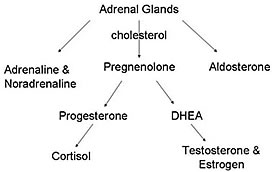Adrenal Fatigue
 Are You Experiencing Adrenal Fatigue?
Are You Experiencing Adrenal Fatigue?
Do you feel tired for no reason even after 12 hours of sleep?
Do you have trouble getting up in the morning?
Do you use coffee, colas, or sweet and salty snacks for energy?
Do you feel run down and stressed?
If you answered "yes" to any of these questions, you may be
experiencing adrenal fatigue.
The Adrenal Glands:
The adrenal glands are small triangular-shaped endocrine glands that sit on top of the two kidneys. They are responsible for releasing hormones in conjunction with stress through the synthesis of cortisol and adrenaline (epinephrine). The adrenals also secrete hormones such as DHEA, and to a lesser extent testosterone and estrogens. After menopause the adrenals become the major source for these hormones in womenThe adrenal hormones help to balance your blood sugar, which helps your body to manage its demands for energy. When blood sugar drops, the adrenals release cortisol that causes blood sugar to rise, thereby increasing energy. The adrenals also release hormones when we're under stress - it's the "fight or flight" response from the days when our ancestors needed to fight for their lives in the wilderness. Today the wilderness has been taken over by traffic jams, arguments, and pressures at work and home.
Constant stress takes a toll on your adrenal glands, and eventually they stop producing adequate hormones. Most doctors fail to diagnose this condition because they have been taught to only diagnose extreme dysfunction in the adrenals, such as Addison's disease, a true emergency where the adrenals fail to produce enough cortisol to keep us alive.
Signs of Adrenal Fatigue:
- Brain fog, cloudy-headedness
- Mild depression
- Low thyroid function
- Low blood sugar levels
- Fatigue - especially morning and mid-afternoon
- Sleep disruption
- Low blood pressure
- Frequent infections
- Inflammation
- Salt and sugar cravings
- Muscle and joint pain
- Reduced sex drive and erectile dysfunction
- Diminished ability to deal with stress
Dr Smolenski's Integrative Program for Adrenal Fatigue
Using a functional medicine approach, Dr Smolenski treats adrenal fatigue and related hormonal imbalance by focusing on the bio-chemically unique aspects of each patient. The first step is comprehensive saliva testing to determine how much cortisol you are producing and the time of day it is being produced. Bioidentical hormone replacement therapy is started when necessary and it is supplemented with pharmaceutical grade nutrients and herbs. Vitamins B, C and E, minerals such as magnesium and calcium, and herbs including licorice root extract, ashwagandha, and ginseng may be used to support your adrenal function.
The stress that caused your adrenals to fatigue is best treated by modifying lifestyle choices. Avoid excessive caffeine, high glycemic carbohydrates, alcohol and sugar. Instead, eat regular meals throughout the day that includes quality protein with complex carbohydrates. Getting enough sleep at night is essential for the body to regenerate and repair the adrenal glands - at night is when your growth hormone levels peak. Finally, evaluate the stress in your life and practice stress management with exercise, tai-chi or yoga and spend time with friends whose company you enjoy.
Dr Smolenski's focus is on the individual's unique physiological processes, the environmental inputs, and the genetic predispositions that influence health and disease. Dr Smolenski's interventions treat the cause of adrenal fatigue, not just mask the symptoms. The body's hormonal and physiological systems have a complex web-like interconnection which is much like a "symphony" - when the body's "instruments" are finely tuned and playing together in harmony there will be beautiful music.
Ongoing evaluations that focus on balancing your hormones in accordance with your symptoms is critical for an effective hormone program
To determine your individual needs, state of the art diagnostic testing utilizing urine, blood and salivary specimens are used to assess your hormone balance. After starting hormone therapy, Dr Smolenski meets with you to discuss your progress and symptoms and to monitor your hormone levels.
Read about Thyroid Disorders



 Join Our Mailing List
Join Our Mailing List